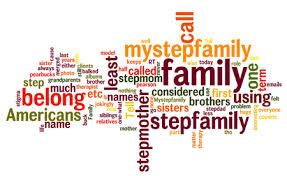 I watched Andrew Solomon’s Ted talk, “Love, No Matter What,” recently. And, it got me thinking about its relevance to stepfamilies and creating a stepfamily you love.
I watched Andrew Solomon’s Ted talk, “Love, No Matter What,” recently. And, it got me thinking about its relevance to stepfamilies and creating a stepfamily you love.
If you haven’t already seen it or it’s been awhile since you last watched Andrew’s talk, here it is:
http://www.ted.com/talks/andrew_solomon_love_no_matter_what?language=enAndrew’s key messages around what it is like to raise a child who is fundamentally different from you work for stepfamilies too. In fact, they line up quite nicely with what research tells us about developing successful stepfamilies:
- You don’t have to accept subtractive models of love, only additive ones.
- Acceptance takes time.
- It’s our differences, and our negotiation of difference, that unite us.
- We need diversity of affection and diversity of family in order to strengthen the ecosphere of kindness.
It also got me thinking about that deeper question for stepparents. The often undiscussed question that no matter how it’s answered draws offence from someone somewhere. Can a stepparent share the unconditional love that exists between a parent and a biological child?
It would come as no surprise that if we asked that question to a room full of stepparents from around the globe there would be just as many resounding ‘yeses’ as there were shouts of ‘no way in hell’. I’d hazard a guess that if we filled that same room full of biological parents (particularly those co-parenting but not co-habitating with their child’s stepparent) their honest answer would be that there is no way a stepparent could love their child the way that they do. And, the fact is they are all probably right. At the end of the day love is a feeling and feelings like people need to be accepted. Love is also unique because just as it can’t be forced it also can’t be avoided.
Being a stepparent and having biological children of my own, my personal view is that the answer to that question depends on four things:
- The age of your stepchildren when you enter their life,
- How long you’ve known each other,
- Whether you decide the relationship will begin as a marathon or a sprint, and
- Whether the child’s other parent facilitates or undermines the relationship.
My stepson was just over 2 ½ when we met and 12 years on I feel the love. You know the protective, full-on kind of love. The -‘I’d jump in front of a bullet or cut off my right arm to not see him hurt’ -kind. The unconditional kind. The kind I feel for my partner and for my biological kids.
The difference for me is that the unconditional acceptance that Andrew speaks about came first with my stepson before the unconditional love kicked in. I had no choice really. I’m a white, pasty-skinned, blue-eyed, blond haired female and my stepson has the olive skin, deep brown eyes and dark hair that I dreamed of for myself as a little girl. I am an American. My stepson is Australian. I am Protestant. He is Catholic. I grew up in a rural community in Midwest USA with a total population of 450 people. My stepson has been raised in one of the biggest and most multicultural and diverse cities in the world. My parents have been together my entire life – married over 50 years. My stepson’s parents separated just after his first birthday. He understands and speaks a language I can’t even pronounce. I had no choice. We are fundamentally different and there was nothing I could have done or tried to do that was ever going to change that.
With my biological children, the love was immediate. I know that isn’t the case for every birthing mother. Nor is it a requirement for motherhood. It just happened to be my experience, but if I’m honest the unconditional acceptance part has not come as easily. Why so different from the experience with my stepson? Maybe, it’s partly because I haven’t known my biological children for as long as I’ve known my stepson? Acceptance does take time.
Maybe, I can see more of myself in their faces and that brings with it unconscious (and perhaps unwanted) expectations? Maybe, because they have two parents instead of three and live with me full time instead of half the time I feel I have more sway in what they will become? All of these things probably play a part. But, mostly I think it comes down to choice. I have more of a choice around acceptance but had less around love with my biological children. And, as we know, choice can sometimes get in the way.
My stepson has taught me something special when it comes to parenting: Making a deliberate choice of acceptance as a parent is just as important as choosing love.
Trisha Ladogna, 41, and Rachel Ruby are co-creators of the blog http://www.steppingthrough.com.au helping repartnered couples with kids create a stepfamily and life they love.
